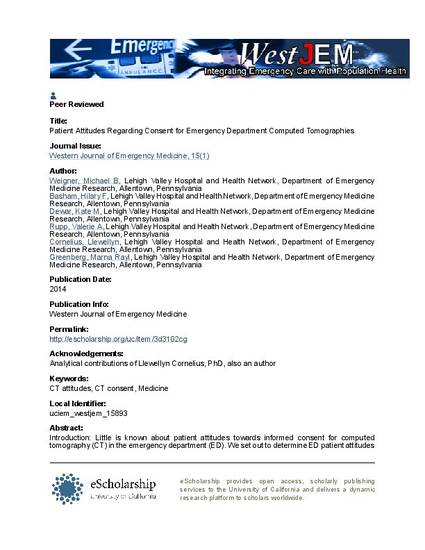
INTRODUCTION: Little is known about patient attitudes towards informed consent for computed tomography (CT) in the emergency department (ED). We set out to determine ED patient attitudes about providing informed consent for CTs.
METHODS: In this cross-sectional questionnaire-based survey study, we evaluated a convenience sample of patients' attitudes about providing informed consent for having a CT at 2 institutional sites. Historically, at our institutional network, patients received a CT at approximately 25% of their ED visits. The survey consisted of 17 "yes/no" or multiple-choice questions. The primary outcome question was "which type of informed consent do you feel is appropriate for a CT in the Emergency Department?"
RESULTS: We analyzed 300 survey responses, which represented a 90% return rate of surveys distributed. Seventy-seven percent thought they should give their consent prior to receiving a CT, and 95% were either comfortable or very comfortable with their physician making the decision regarding whether they needed a CT. Forty percent of the patients felt that a general consent was appropriate before receiving a CT in the ED, while 34% thought a verbal consent was appropriate and 15% percent thought a written consent was appropriate. Seventy-two percent of the ED patients didn't expect to receive a CT during their ED visit and 30% of the ED patients had previously provided consent prior to receiving a CT.
CONCLUSION: Most patients feel comfortable letting the doctor make the decision regarding the need for a CT. Most ED patients feel informed consent should occur before receiving a CT but only a minority feel the consent should be written and specific to the test.
http://search.ebscohost.com/login.aspx?direct=true&db=mnh&AN=24578764&site=ehost-live&scope=site
Weigner, M., Basham, H., Dewar, K., Rupp, V., Cornelius, L., & Greenberg, M. (2014). Patient attitudes regarding consent for emergency department computed tomographies. The Western Journal Of Emergency Medicine, 15(1), 14-19. doi:10.5811/westjem.2013.5.15893.

Western Journal of Emergency Medicine: Integrating Emergency Care with Population Health is available open access at http://escholarship.org/uc/item/3d3102cg?query=weigner#page-1